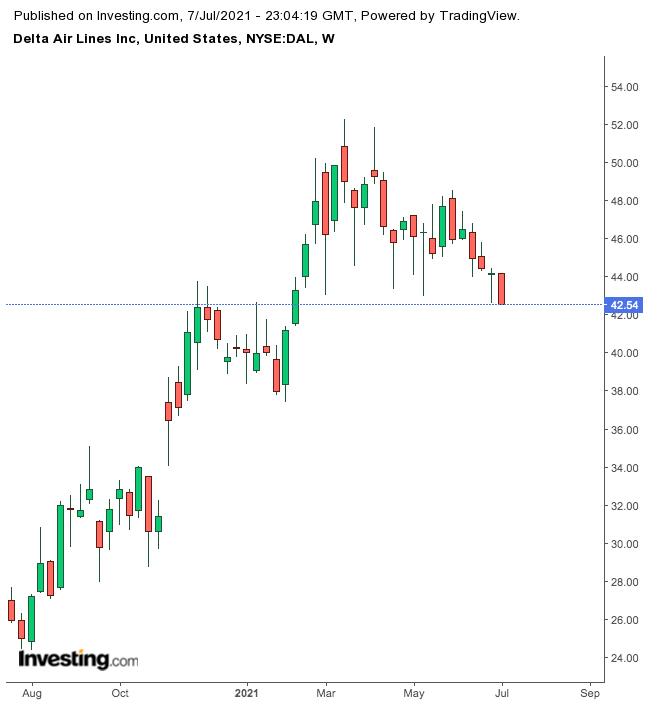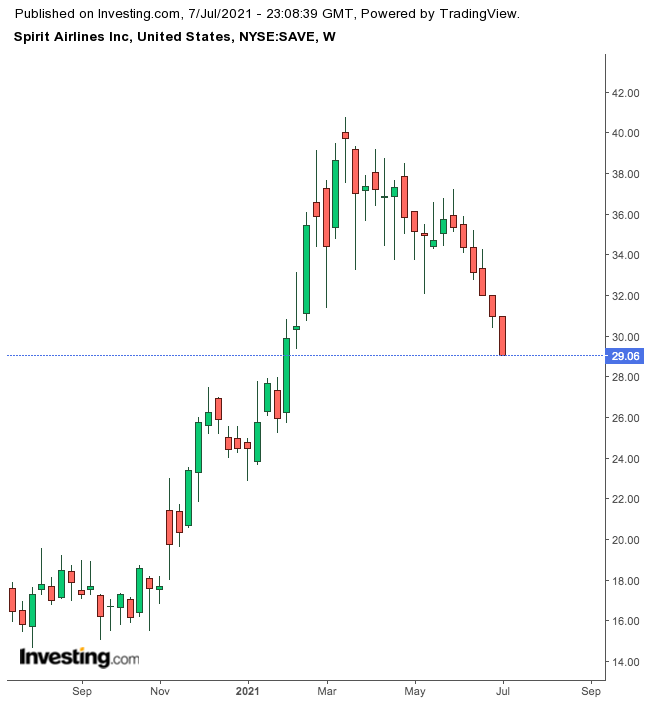Airline stocks, one of the most popular reopening trades, aren’t moving in the direction investors had hoped.
The US Global Jets ETF (NYSE:JETS) has shed more than 15% during the past quarter, just as more and more people are taking flights after a long pandemic break. The US Transportation Security Administration said last Friday that airport screenings have climbed above 2019 levels for the first time since the outbreak of the health crisis, signalling strong travel demand for the summer months.
The strength of the US travel rebound is also evident from the capacity constraints airlines are facing. Many leading airlines in the US are racing to add pilots and ground staff who were made redundant by the collapse of travel demand last year. Southwest Airlines (NYSE:LUV), for example, offered flight attendants and ground staff double pay to work extra shifts over the July Fourth holiday period.
In another sign that airlines see better days ahead, United Airlines (NASDAQ:UAL) said last week it’s ordering 270 narrow-body airliners from Boeing (NYSE:BA) and Airbus (PA:AIR)—its largest aircraft order ever. The airline is also on a hiring spree, as it aims to add about 25,000 employees, including pilots, flight attendants and mechanics, for the new planes. United expects to post positive adjusted pretax income next month for the first time since January 2020.
One possible explanation for this bearish spell in airline stocks despite the concurrent surge in travel demand is that the easy money has already been made in this trade. The next stage of growth, which will depend on the resumption of international and business travel, is still facing a variety of uncertainties as new COVID variants emerge and companies look to cut costs.
A Long-Term Bet
On a webcast last month, Delta Air Lines (NYSE:DAL) Chief Executive Ed Bastian said the carrier would operate twice as many domestic flights in July as in May. Still, “business travel is very limited right now,” he said.

For many executives and employees, business trips may not be necessary going forward as they feel comfortable handling their clients’ needs via videoconference. Some executives plan to hold meetings with their employees by video call from now on.
In sales, some professionals say they have found that online meetings even give them certain advantages over face-to-face pitches, according to a recent survey in the Wall Street Journal.
These anecdotes from industry experts suggest that investing in airline stocks is now a long-term bet with a belief that at some point long-haul travel—the most profitable segment for airlines—will recover, helping these carriers to reclaim sales that they were making before the pandemic. After 9/11, it took the airline industry six years to recover.
In this segment, Delta is emerging as an attractive long-term buy. Analysts at Jefferies recently upgraded the stock to buy from hold, saying in a note that it is well-positioned to benefit from the evolving economic recovery. About half of DAL’s sales are corporate, with 50% of that exposure belonging to small- and medium-sized business travel.
International travel should also be a strong point for Delta given its outsized exposure to Europe, Jefferies said. The firm hiked its price target for Delta to $60 per share from $50. The new target is about 40% above where the stock was trading on Wednesday, when it closed at $42.54.

For analysts at Citi, low-cost air carrier Spirit Airlines (NYSE:SAVE) also looks cheap. They say the stock’s recent struggles “opened value in the shares” and they've updated guidance signals that it was time to buy the dip. Their note said:
“Costs associated with re-starting some operations look poised to pressure ex-fuel [cost per available seat mile] more than we had previously anticipated, while fuel prices keep rising. However, summer 2021 travel demand indicators also look poised to support domestic leisure-oriented passenger revenue.”
Citi hiked its price target on Spirit by $2 to $42 per share, which is more than 40% above where the stock traded on Wednesday, when it closed at $29.06.
Bottom Line
The majority of airline stocks are already reflecting a strong rebound in domestic travel after the rollout of vaccines in the US. The next phase of growth is very much dependent on the resumption of international and business travel.
Airlines with strong exposure to this segment, like Delta, will benefit when that happens.
